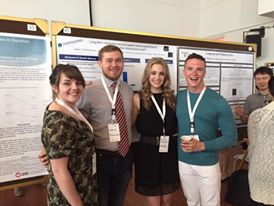Other Previous Courses
PSYC 4005 – Systems and Theories in Psychology
Restricted to students in the fourth year of the Honours Psychology program.
You will investigate and discuss major historical figures and events in psychology, big conceptual issues that define and differentiate the diverse theoretical and measurement approaches across psychology, and historical and modern applications of psychology.
The course will consist of traditional lectures, small group presentations and discussions, general class participation, select paper summaries and evaluations, a role-based autobiographical seminar presentation, a debate with a classmate presenting another major figure in psychology, content-based midterms, and various paper summaries corresponding to the participation and presentation activities in the classroom.
By the end of the course, you should be able to:
1. recognise the role of major historical figures and events in the development of Psychology,
2. discuss the fundamental issues underpinning various psychological theories and methods,
3. demonstrate clear oral and written understanding of course content, and
4. articulate how the core conceptual issues apply to modern psychological investigations and understanding.
Most Recent Syllabus Psyc 4005
PSYC 3916 Advanced Readings in Psychology
Restricted to third or fourth year students in the Honours Psychology program and requires approval of the discipline to register. Students wishing to take this course during the following Spring/Summer or Fall/Winter Session must apply in writing to the discipline no later than February 15.
This course is intended for advanced students interested in a particular topic of psychology. Students are required to do a thorough literature review on a topic of interest resulting in a paper at the end of the course.
PSYC 2616 Theories of Personality
Prerequisites PSYC1106 and PSYC1107.
PSYC 2616: This course will introduce you to the major theories, concepts, and findings in the psychology of Personality through course readings, lectures, videos, discussions, and various assignments. You will learn how people differ in their emotional reactions, motivations, interpersonal approaches, cognitive biases, and fundamental belief systems. These perspectives will include evaluating different structural, process, and developmental models of personality.
Previous Courses Taught at the University of Manitoba
CHILD DEVELOPMENT
ADOLESCENT DEVELOPMENT
INTRODUCTION TO RESEARCH METHODS (STATISTICS)
ABNORMAL PSYCHOLOGY
PSYCHOLOGY OF PERSONALITY

